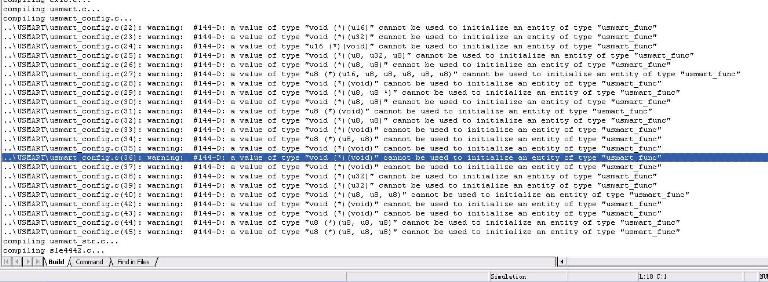在USMART(一个串口调试互交组建)的设计过程中,需要一个通用的函数原型,来匹配各种函数(不包含指针参量,即参数和返回值都不为指针类型).以达到函数受usmart管理的目的.
下面是核心定义:
//定义一个通用的函数类型
//usmart_func的返回值为u32,参数待定.
typedef u32(*usmart_func)();//定义函数类型
//函数名列表
struct _m_usmart_nametab
{
usmart_func func; //函数指针
const u8* name; //函数名(查找串)
};
//usmart控制管理器
struct _m_usmart_dev
{
struct _m_usmart_nametab *funs; //函数名指针
void (*init)(void); //初始化
u8 (*cmd_rec)(u8*str); //识别函数名及参数
void (*exe)(void); //执行
void (*scan)(void); //扫描
u8 fnum; //函数数量
u8 pnum; //参数数量
u8 id; //函数id
u32 p
ARM[MAX_PARM]; //函数的参数(最大参数)
};
extern struct _m_usmart_nametab usmart_nametab[]; //在usmart_config.c里面定义
extern struct _m_usmart_dev usmart_dev; //在usmart_config.c里面定义
上面,我把通用的函数原型定义为u32的返回类型,以适应最大返回值的情况.但是这样的定义,在函数返回值为void或者u8,u16的时候,会产生警告.不知道有没有办法让函数原型可以返回任意值,而不产生警告呢?
在另外一个.c文件里面,通过如下方法初始化函数名列表:
//函数名列表初始化(用户自己添加)
//用户直接在这里输入要执行的函数名及其查找串
struct _m_usmart_nametab usmart_nametab[]=
{
delay_ms,"delay_ms",
delay_us,"delay_us",
SPI_Flash_ReadID,"SPI_Flash_ReadID",
Seg_Show_Num,"Seg_Show_Num",
Seg_Show_Char,"Seg_Show_Char",
RTC_Set,"RTC_Set",
Seg_Clear,"Seg_Clear",
Seg_Show_Str,"Seg_Show_Str",
EXIO_Set,"EXIO_Set",
EXIO_Scan,"EXIO_Scan",
Seg_Dot_Set,"Seg_Dot_Set",
ATR_TEST,"ATR_TEST",
Test_Read,"Test_Read",
MRAM_Read,"MRAM_Read",
RAM_Read,"PRAM_Read",
Start_Transac
tion,"Start_Transaction",
TEST_RD_REC,"TEST_RD_REC",
TEST_WR_REC,"TEST_WR_REC",
Sle_WR_Cmd,"Sle_WR_Cmd",
Flash_Get_Recnum,"Flash_Get_Recnum",
SPI_Flash_Erase_Chip,"SPI_Flash_Erase_Chip",
TEST_WR_ALL,"TEST_WR_ALL",
Test_Write,"Test_Write",
TEST_Ver,"TEST_Ver",
};
以上各个函数,有的返回void,有的返回u8有的返回u16.导致很多警告.希望高人指点一下,如何能去掉这些警告?
下面是编译后的警告:

图片不清晰,看下面的:
..USMARTusmart_config.c(22): warning: #144-D: a value of type "void (*)(u16)" cannot be used to initialize an entity of type "usmart_func"
..USMARTusmart_config.c(23): warning: #144-D: a value of type "void (*)(u32)" cannot be used to initialize an entity of type "usmart_func"
..USMARTusmart_config.c(24): warning: #144-D: a value of type "u16 (*)(void)" cannot be used to initialize an entity of type "usmart_func"
..USMARTusmart_config.c(25): warning: #144-D: a value of type "void (*)(u8, u32, u8)" cannot be used to initialize an entity of type "usmart_func"
..USMARTusmart_config.c(26): warning: #144-D: a value of type "void (*)(u8, u8)" cannot be used to initialize an entity of type "usmart_func"
..USMARTusmart_config.c(27): warning: #144-D: a value of type "u8 (*)(u16, u8, u8, u8, u8, u8)" cannot be used to initialize an entity of type "usmart_func"
..USMARTusmart_config.c(28): warning: #144-D: a value of type "void (*)(void)" cannot be used to initialize an entity of type "usmart_func"
..USMARTusmart_config.c(29): warning: #144-D: a value of type "void (*)(u8, u8 *)" cannot be used to initialize an entity of type "usmart_func"
..USMARTusmart_config.c(30): warning: #144-D: a value of type "void (*)(u8, u8)" cannot be used to initialize an entity of type "usmart_func"
..USMARTusmart_config.c(31): warning: #144-D: a value of type "u8 (*)(void)" cannot be used to initialize an entity of type "usmart_func"
..USMARTusmart_config.c(32): warning: #144-D: a value of type "void (*)(u8, u8)" cannot be used to initialize an entity of type "usmart_func"
..USMARTusmart_config.c(33): warning: #144-D: a value of type "void (*)(void)" cannot be used to initialize an entity of type "usmart_func"
..USMARTusmart_config.c(34): warning: #144-D: a value of type "u8 (*)(u8, u8)" cannot be used to initialize an entity of type "usmart_func"
..USMARTusmart_config.c(35): warning: #144-D: a value of type "void (*)(void)" cannot be used to initialize an entity of type "usmart_func"
..USMARTusmart_config.c(36): warning: #144-D: a value of type "void (*)(void)" cannot be used to initialize an entity of type "usmart_func"
..USMARTusmart_config.c(37): warning: #144-D: a value of type "void (*)(void)" cannot be used to initialize an entity of type "usmart_func"
..USMARTusmart_config.c(38): warning: #144-D: a value of type "void (*)(u32)" cannot be used to initialize an entity of type "usmart_func"
..USMARTusmart_config.c(39): warning: #144-D: a value of type "void (*)(u32)" cannot be used to initialize an entity of type "usmart_func"
..USMARTusmart_config.c(40): warning: #144-D: a value of type "void (*)(u8, u8, u8)" cannot be used to initialize an entity of type "usmart_func"
..USMARTusmart_config.c(42): warning: #144-D: a value of type "void (*)(void)" cannot be used to initialize an entity of type "usmart_func"
..USMARTusmart_config.c(43): warning: #144-D: a value of type "void (*)(void)" cannot be used to initialize an entity of type "usmart_func"
..USMARTusmart_config.c(44): warning: #144-D: a value of type "u8 (*)(u8, u8, u8)" cannot be used to initialize an entity of type "usmart_func"
..USMARTusmart_config.c(45): warning: #144-D: a value of type "u8 (*)(u8, u8, u8)" cannot be used to initialize an entity of type "usmart_func"



 举报
举报

 举报
举报

 举报
举报

 举报
举报

